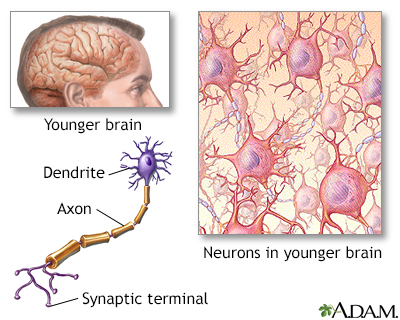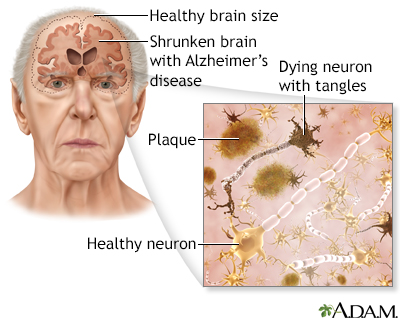Aging changes in the nervous system
The brain and nervous system are your body's central control center. They control your body's:
- Movements
- Senses
- Thoughts and memories
They also help control the organs such as your heart and bowels.
Nerves are the pathways that carry signals to and from your brain and the rest of your body. The spinal cord is the bundle of nerves that runs from your brain down the center of your back. Nerves extend out from the spinal cord to every part of your body.
AGING CHANGES AND THEIR EFFECTS ON THE NERVOUS SYSTEM
As you age, your brain and nervous system go through natural changes. Your brain and spinal cord lose nerve cells and weight (atrophy). Nerve cells may begin to pass messages more slowly than in the past. Waste products or other chemicals such as beta amyloid can collect in the brain tissue as nerve cells break down. This can cause abnormal changes in the brain called plaques and tangles to form. A fatty brown pigment (lipofuscin) can also build up in nerve tissue.
Breakdown of nerves can affect your senses. You might have reduced or lost reflexes or sensation. This leads to problems with movement and safety and makes it more likely to suffer falls.
Slowing of thought, memory, and thinking is a normal part of aging. These changes are not the same in everyone. Some people have many changes in their nerves and brain tissue. Others have few changes. These changes are not always related to the effects on your ability to think.
NERVOUS SYSTEM PROBLEMS IN OLDER PEOPLE
Dementia and severe memory loss are not a normal part of aging. They can be caused by brain diseases such as Alzheimer disease, which doctors believe is associated with plaques and tangles forming in the brain.
Delirium is sudden confusion that leads to changes in thinking and behavior. It is often due to illnesses that are not related to the brain. Infection can cause an older person to become severely confused. Certain medicines can also cause or complicate this.
Thinking and behavior problems can also be caused by poorly controlled diabetes. Rising and falling blood sugar levels can interfere with thought.
Talk with your health care provider if you have any changes in:
- Memory
- Thought
- Ability to perform a task
Seek medical help right away if these symptoms occur suddenly or along with other symptoms. A change in thinking, memory, or behavior is important if it is different from your normal patterns or it affects your lifestyle.
PREVENTION
Mental and physical exercise can help your brain stay sharp. Mental exercises include:
- Reading
- Doing crossword puzzles
- Stimulating conversation
Physical exercise promotes blood flow to your brain. It also helps reduce loss of brain cells.
OTHER CHANGES
As you grow older, you will have other changes, including:

The nervous system controls the many complicated and interconnected functions of the body and mind. Motor, sensory cognitive and autonomic function are all coordinated and driven by the brain and nerves. As people age, nerve cells deteriorated in number and facility, causing some lessening in function.

Aged nervous tissue is less able to rapidly communicate with other neural tissues.
References
Basco MD, Gorgon EJ, Barredo R, Schulte OJ, Stephens J, Ann J. Aging, dementia, and disorders of cognition. In: Lazaro RT, Reina-Guerra SG, Quiben MU, eds. Umphred's Neurological Rehabilitation. 7th ed. St Louis, MO: Elsevier; 2020:chap 27.
Martin J, Li C. Normal cognitive aging. In: Fillit HM, Rockwood K, Young J, eds. Brocklehurst's Textbook of Geriatric Medicine and Gerontology. 8th ed. Philadelphia, PA: Elsevier; 2017:chap 28.
Sowa GA, Weiner DK, Camacho-Soto A. Geriatric pain. In: Benzon HT, Raja SN, Liu SS, Fishman SM, Cohen SP, eds. Essentials of Pain Medicine. 4th ed. Philadelphia, PA: Elsevier; 2018:chap 41.
Williamson T, Massie L, Karikari I, Shaffrey CI, Abd-El-Barr MM. Differential diagnosis of spinal disease. In: Winn HR, ed. Youmans and Winn Neurological Surgery. 8th ed. Philadelphia, PA: Elsevier; 2023:chap 311.
Version Info
Last reviewed on: 7/21/2022
Reviewed by: Frank D. Brodkey, MD, FCCM, Associate Professor, Section of Pulmonary and Critical Care Medicine, University of Wisconsin School of Medicine and Public Health, Madison, WI. Also reviewed by David C. Dugdale, MD, Medical Director, Brenda Conaway, Editorial Director, and the A.D.A.M. Editorial team.
